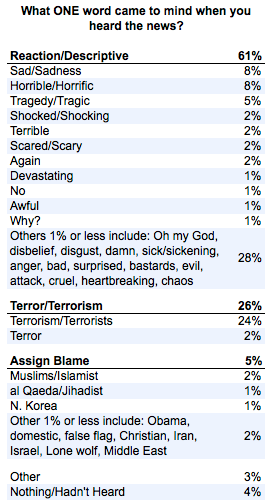
WASHINGTON -- Shock. Sadness. Horror. Terrorism. Those are the first thoughts that Americans had when they heard the news of the Boston Marathon bombing, according to a new HuffPost YouGov poll. But relatively few rushed to assign blame.
The news left powerful initial impressions on the 96 percent of respondents who said they had heard about the bombs going off in Boston. HuffPost asked respondents who had heard about the events to give their one-word reaction.

While they used many different words, a large majority (61 percent) said their first thoughts were of dismay. The words mentioned most often in this category included "sadness," "horror," "tragedy" and "shock." A significant minority (26 percent) said their first thoughts were of "terrorism," "terrorists" or "terror" generally. Only a handful (5 percent) responded with a word implying an attempt to assign blame or responsibility, such as "Muslim" or "al Qaeda."
A follow-up question confirmed a general reluctance to speculate about responsibility so soon after the attack. Asked if they thought "foreign terrorists" were responsible, 27 percent said they were, 21 percent said they were not, and 52 percent said they weren't sure.
Not surprisingly, the Boston bombings served to heighten concerns about terror threats, although only 23 percent said they now feel "less safe" from terrorist attacks than they were after 9/11. The majority said they either feel safer from terrorist attacks (30 percent) or the same as they did in 2001 (37 percent). In a prior YouGov/Economist survey conducted in April 2012, 49 percent of respondents said that Americans were safer than in 2001, 10 percent said they were less safe, and 32 percent said safety was about the same.
The latest poll also sheds light on how news of the Boston bombing spread. While the largest percentage of respondents first heard the story on television, the results point as well to the influence of new media, especially as an initial source of information and among younger adults.
Thirty-seven percent said they initially heard about the explosions on television, but almost as many (32 percent) said they heard about it first from either the Internet (23 percent) or social media (9 percent). Eighteen percent said they heard about the bombs going off from talking to other people, while 10 percent said they heard about it over the radio. Less than 1 percent initially read the news in a newspaper.
Among the youngest respondents (those under age 30), 28 percent said they heard the news online and 19 percent said they heard it through social media.
One note of caution: Because the survey was conducted online, all respondents had Internet access, meaning they might be more likely than non-Internet users to learn the news online.
After initially hearing about the explosions, most respondents (53 percent) said they continued to follow the story on television, though younger respondents were more likely to say they continued to follow it online or on social media.
The poll was conducted April 15-16 among 1,000 adults using a sample selected from YouGov's opt-in online panel to match the demographics and other characteristics of the adult U.S. population. Factors considered include age, race, gender, education, employment, income, marital status, number of children, voter registration, time and location of Internet access, interest in politics, religion and church attendance.
The Huffington Post has teamed up with YouGov to conduct daily opinion polls. You can learn more about this project and take part in YouGov's nationally representative opinion polling.
